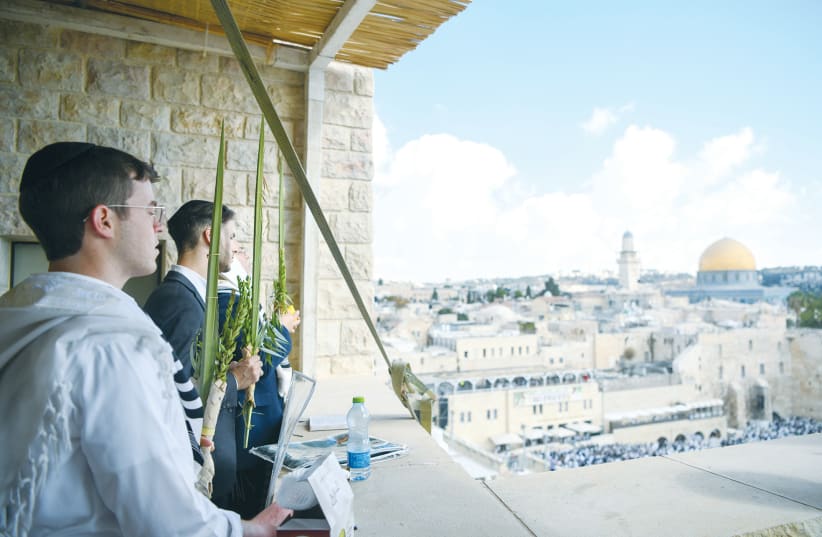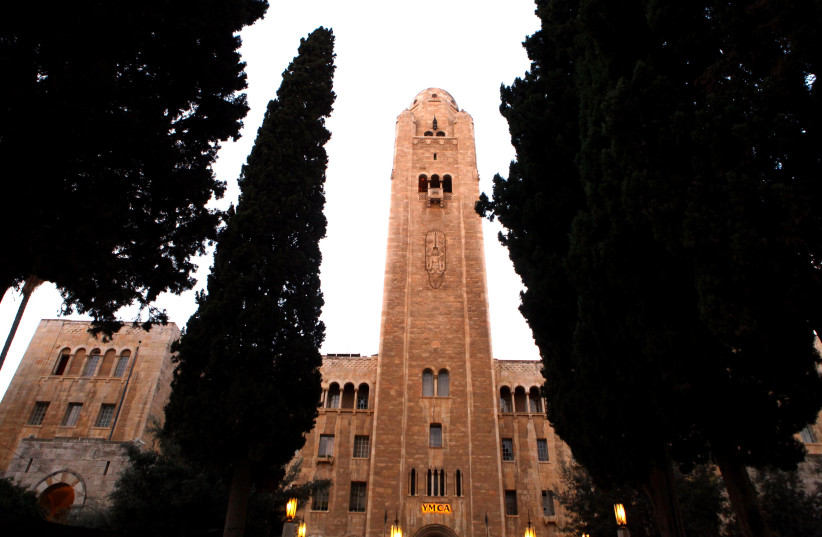Bless you!
Considering the limits imposed by the coronavirus, this Sukkot’s traditional Priestly Blessing was a big success. To accommodate more people, the ceremony, led by hundreds of kohanim from across the country, was held twice – on Wednesday and Thursday.
Thousands of Jews from across the country and abroad flocked to the Western Wall Plaza for the traditional blessing introduced in the Torah. Launched 40 years ago, it has been held without interruption twice annually since, on Passover and Sukkot. This year, 8,000 men were permitted to reach the Kotel Plaza, through hundreds of capsules. The Western Wall Heritage Foundation, in charge of the ceremony, also broadcast the entire ceremony live for those who were unable to enter the site.
All roads leading to the Old City were blocked during the festival, allowing only neighborhood residents to enter, with visitors and pilgrims requested to use the shuttle available at nearby parking areas. Some 8,000 policemen were deployed during the High Holidays in the city.
Strike a deal
Another nearly annual – though less joyous – tradition at this time of year is the threat of a strike in the education system. This time, the threat for a total strike is coming from the Daycare Assistants Association, which wants their employer – the municipality – to regulate their working conditions and pension rights.
Weeks from now, the 900 employees who work in afternoon enrichment programs in municipal preschools and first grades may choose to disable all these city institutions, affecting about 10,000 children aged three to six. The association says the strike comes as a last resort following the refusal of the municipality and the community administrations (the local councils in which these preschools operate) to discuss improving the employment conditions.
The association says that while there are only about 22 children in those frameworks in the rest of the country, the average number in Jerusalem stands at 30, thus requiring more employees. Yet because salaries are so low, it is practically impossible to find additional candidates for the jobs.
Waste not
The first permanent residence in Israel for a food rescue group was inaugurated earlier this week (September 22) in Givat Shaul. This permanent home will include a visitors center, the first of its kind in the country, which promotes ongoing activities with the wholesale market, to systematically save food to help needy families and provide a platform for discourse around the food system. The center also has a workshop space and an industrial kitchen, and will be open to the general public – for educational activities, food preservation workshops, lectures and panels, catering activities and community cuisine.
The Food Rescue Center, which operates the new facility, provides weekly assistance for about 800 needy families in 22 neighborhoods in Jerusalem and surroundings.
This initiative is designed to create a holistic system model for the local food system that minimizes waste, also making it an example for other cities. Mayor Moshe Lion, who launched the new center, said he welcomes the establishment of a permanent residence for this group, which cooperates with the business sector – including the Jerusalem wholesale market owners and employees, food vendors and restaurateurs throughout the capital.
“In this way, it helps needy families and encourages the creation of an optimal reality for all,” said Lion.
The group consists of diverse, multi-age populations: single mothers, participants in community centers, local students, companies, the elderly, as well as the ultra-Orthodox and Palestinian sectors – all working in collaboration with the wholesale market in Givat Shaul, their suppliers, and food producers in Jerusalem and surroundings.
Over the hill
The local planning and construction committee at Safra Square has approved a new outline plan to expand the number of housing units in the Givat Hamatos neighborhood. The master plan for the area, including an additional 3,900 units, was presented last year but not approved until now. It will supersede the already-approved 2014 outline plan’s 2,610 housing units.
Being under the jurisdiction of the Local Planning Committee, this new plan doesn’t need to go before the District Planning Committee, so tenders for construction will be published and accepted at an early stage. While those eager to provide more housing solutions in the city welcome this, it raises concern among left-wing NGOs like Ir Amim.
Light brigade
During Sukkot and for a few additional months hence, the city’s iconic YMCA building is set to be illuminated for the first time.
Part of a larger “Monument Lighting” project led by the municipality with the Jerusalem and Heritage Ministry, the months-long lighting project will spectacularly light up a number of prominent buildings located in Jerusalem tourist areas: the historic Flour Mill in Mishkenot Sha’ananim, the Mount Zion connection canal, the walls and gates of the Old City and more.

